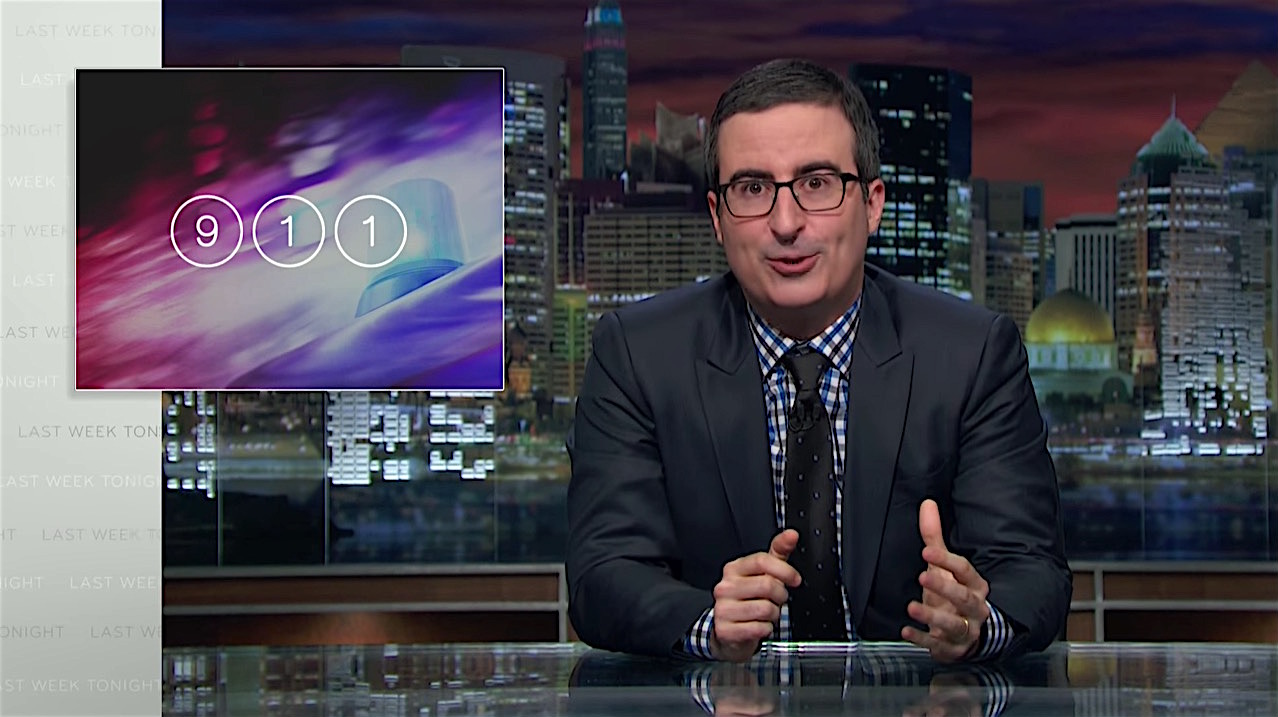John Oliver doesn't want calling 911 to be a joke. So he made this brutally frank PSA.


A free daily email with the biggest news stories of the day – and the best features from TheWeek.com
You are now subscribed
Your newsletter sign-up was successful
The main story on Sunday's Last Week Tonight was about 911, a service we all take for granted. "We make roughly 240 million 911 calls each year, and the dispatchers do amazing work, talking people through childbirth, CPR, abductions, and home break-ins," John Oliver said. "In fact, we're so accustomed to relying on them, we even call when we don't have an emergency." He played some of those non-emergency calls, which ranged from absurd to cute. "We have a lot of faith in 911," he added, "but the system can break down more than you think, and when it does, people can die as a result."
One big problem is that 911 dispatchers can't accurately tell your location if you are on a cellphone, for reasons nobody seems to be able to explain. That's not the only problem with 911 centers, though, Oliver said. "Depending on where you live, they may also be underfunded, understaffed, and full of outdated technology — which is fine, if you're describing a Radio Shack." But you expect more from your emergency centers, and so he explained some reasons why "we have an antiquated, disjointed system populated by workers who are understandably sick of listening to people's butts."
On the funding front, for example, "what makes this even more frustrating is that almost everyone's phone bill has a line like this on it," Oliver said, showing a 911 service fee, "which you might assume goes directly to fund 911 centers. But the FCC's fee report shows that since 2008, at least 20 states have diverted those dollars elsewhere. Which is probably why, depending on where you live, 911 may be a joke in your town." He used New York State as an example of the "blasé attitude" toward this fiscal sleight of hand, then argued that "until we're explicitly confronted with the challenges facing 911, it seems we're not going to do anything about them. And maybe the problem is that we are taught from a young age to take 911 for granted. So perhaps it's time for that to change." Watch to the end for the PSA featuring Rob Riggle as a foul-mouthed fireman. Peter Weber
The Week
Escape your echo chamber. Get the facts behind the news, plus analysis from multiple perspectives.

Sign up for The Week's Free Newsletters
From our morning news briefing to a weekly Good News Newsletter, get the best of The Week delivered directly to your inbox.
From our morning news briefing to a weekly Good News Newsletter, get the best of The Week delivered directly to your inbox.

A free daily email with the biggest news stories of the day – and the best features from TheWeek.com
Peter has worked as a news and culture writer and editor at The Week since the site's launch in 2008. He covers politics, world affairs, religion and cultural currents. His journalism career began as a copy editor at a financial newswire and has included editorial positions at The New York Times Magazine, Facts on File, and Oregon State University.
-
 How to Get to Heaven from Belfast: a ‘highly entertaining ride’
How to Get to Heaven from Belfast: a ‘highly entertaining ride’The Week Recommends Mystery-comedy from the creator of Derry Girls should be ‘your new binge-watch’
-
 The 8 best TV shows of the 1960s
The 8 best TV shows of the 1960sThe standout shows of this decade take viewers from outer space to the Wild West
-
 Microdramas are booming
Microdramas are boomingUnder the radar Scroll to watch a whole movie
-
 ‘One Battle After Another’ wins Critics Choice honors
‘One Battle After Another’ wins Critics Choice honorsSpeed Read Paul Thomas Anderson’s latest film, which stars Leonardo DiCaprio, won best picture at the 31st Critics Choice Awards
-
 Son arrested over killing of Rob and Michele Reiner
Son arrested over killing of Rob and Michele ReinerSpeed Read Nick, the 32-year-old son of Hollywood director Rob Reiner, has been booked for the murder of his parents
-
 Rob Reiner, wife dead in ‘apparent homicide’
Rob Reiner, wife dead in ‘apparent homicide’speed read The Reiners, found in their Los Angeles home, ‘had injuries consistent with being stabbed’
-
 Hungary’s Krasznahorkai wins Nobel for literature
Hungary’s Krasznahorkai wins Nobel for literatureSpeed Read László Krasznahorkai is the author of acclaimed novels like ‘The Melancholy of Resistance’ and ‘Satantango’
-
 Primatologist Jane Goodall dies at 91
Primatologist Jane Goodall dies at 91Speed Read She rose to fame following her groundbreaking field research with chimpanzees
-
 Florida erases rainbow crosswalk at Pulse nightclub
Florida erases rainbow crosswalk at Pulse nightclubSpeed Read The colorful crosswalk was outside the former LGBTQ nightclub where 49 people were killed in a 2016 shooting
-
 Trump says Smithsonian too focused on slavery's ills
Trump says Smithsonian too focused on slavery's illsSpeed Read The president would prefer the museum to highlight 'success,' 'brightness' and 'the future'
-
 Trump to host Kennedy Honors for Kiss, Stallone
Trump to host Kennedy Honors for Kiss, StalloneSpeed Read Actor Sylvester Stallone and the glam-rock band Kiss were among those named as this year's inductees
